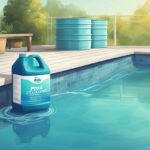A pool aerator is an accessory that can vastly improve your swimming experience by infusing your pool water with oxygen, leading to several beneficial changes. It’s designed to increase the circulation of the water and improve chemical effectiveness, which can help maintain the health of your pool. When considering whether to add an aerator to your pool setup, you should weigh its potential benefits against your specific needs and the climate you live in.

Aeration is a critical process for your swimming pool as it can aid in balancing chemical properties such as pH levels and can reduce the water temperature during hot weather. It works by forcing water into the air and allowing it to absorb oxygen before it returns to the pool, which has a cooling effect and helps to reduce excess carbon dioxide. This can be especially valuable if you reside in a hotter climate where pool water tends to get uncomfortably warm.
Deciding if a pool aerator is worth the investment involves considering its ability to enhance water quality and the comfort of swimmers. It could also lead to some cost savings over time on energy and chemical usage. If you often find yourself struggling with high water temperatures or are looking to ensure your pool’s chemical balance is easier to maintain, a pool aerator might be a sensible addition to your swimming pool equipment.
Understanding Pool Aerators
In pool maintenance, aerators are essential for managing water quality and temperature. They serve a crucial role in ensuring your pool’s environment is comfortable and chemically balanced.
The Role of Aeration in Pool Maintenance
Aeration directly impacts the oxygen levels in your pool, which is pivotal for chemical efficacy and overall water clarity. By introducing air into the water, aeration helps to circulate the pool chemicals more evenly, improving their performance. During the summer, when pool water often becomes uncomfortably warm, aeration can also cool down your pool’s temperature, ensuring a more refreshing swim. Additionally, aeration facilitates the process in which carbon dioxide is released, consequently, it can assist in maintaining the correct pH balance in the water, making your pool safer for use.
Types of Pool Aerators and Their Functions
Pool aerators come in various forms, each serving specific functions:
-
Fountains and Water Features: Often seen as water fountains or waterfall features, these not only enhance the aesthetics of the pool but also induce surface agitation, which increases aeration.
-
Deck Jets: Installed on your pool deck, these shoot streams of water into the pool, adding oxygen to the water and aiding in circulation.
-
Dedicated Aeration Systems: These systems are connected directly to your pool’s pump and use a combination of air and water to increase the oxygenation levels in the pool. They can be custom-fitted to the side of your pool, within the coping or deck region.
For each type, the fundamental purpose is to ensure proper circulation and maintain the chemical balance of the pool by injecting air into the water. Depending on your preference and pool’s design, you can choose an aerator that complements your pool’s functionality and appearance.
All these equipment types form part of a strategy for pool maintenance, and depending on your pool usage and local climate, incorporating one into your pool setup can be advantageous.
Benefits of Pool Aeration
Integrating a pool aerator into your swimming pool setup can provide significant enhancements in terms of water quality and comfort.
Temperature Regulation and Cooling Effects
A primary benefit you’ll observe with pool aeration is temperature regulation. By spraying pool water into the cooler air, aerators effectively lower the water’s temperature. This is especially useful on sweltering days when the heat can make swimming uncomfortable. Aeration accelerates the natural cooling process by increasing the water’s exposure to cooler air, which helps to cool down the pool.
Improved Water Circulation and Quality
Enhanced water circulation is another advantage of employing a pool aerator. By mixing the surface water with the water below, aerators promote more uniform water temperature and quality throughout your pool. This process also increases oxygen levels in the water, which can deter the growth of algae and assist in maintaining a healthy pool environment.
Chemical Balance and Algae Prevention
Managing your pool’s chemical balance becomes simpler with aeration. Aeration can cause an increase in pH levels and a decrease in total alkalinity, minimising the risk of calcium scaling and other imbalances. The infusion of oxygen makes it harder for algae to thrive, hence aeration is a key strategy in algae prevention. Consistent aeration can mean fewer chemicals are required to maintain appropriate chemicals and pH balance, leading to a more pleasant swimming experience.
Selecting the Right Aerator for Your Pool
When you’re in the market for a pool aerator, it’s essential to choose one that suits your specific type of pool and environmental conditions. The right aerator will enhance your pool’s water quality and temperature control.
Aerators for Above-Ground vs Inground Pools
Above-ground pools and inground pools have different requirements when it comes to aerators. For above-ground pools, which often heat up more quickly due to their shallower depths and the heat conduction through the sidewalls, a compact aerator can be quite effective. These pools benefit from an aerator’s ability to lower water temperatures, especially in hot climates.
Inground pools, on the other hand, might need a more robust aeration system due to the larger volume of water. Your choice can also be influenced by your pool’s design and the existing pool equipment. It’s important that the aerator matches up with your inground pool’s circulation system for maximum efficiency.
- Above-Ground Pools: Typically smaller, compact aerators work well.
- Inground Pools: May require a more comprehensive aeration system.
Considerations Based on Pool Size and Climate
When selecting an aerator, pool size and the local climate are key factors. A large pool in a hot, humid climate will need a powerful aerator to make a noticeable difference in water temperature and quality.
- Small to Medium Pools: A simple fountain-type aerator might suffice.
- Large Pools: Look for aerators with greater output and circulation capabilities.
In a hot climate, an aerator’s ability to cool the pool water becomes a significant benefit, making swimming a more refreshing experience. Meanwhile, in a humid climate, ensuring proper water aeration helps maintain the water quality by preventing the growth of bacteria and algae, keeping your pool cleaner and healthier. Consider these factors to effectively manage your pool’s condition:
Hot Climate
- Increased emphasis on cooling capabilities.
- Frequent use may be necessary.
Humid Climate
- Focus on aeration that promotes water quality and clarity.
- Systems that improve circulation and chemical distribution can be advantageous.











